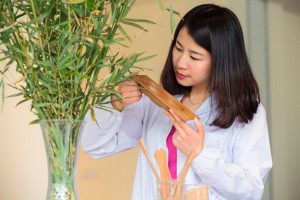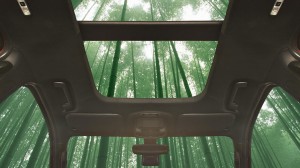
Janet Yin, a materials engineering supervisor at Ford’s Nanjing Research & Engineering Center, shows the strength of bamboo.
Facing constant pressure to make vehicles of any kind lighter and more efficient, carmakers are constantly experimenting with a variety of natural materials that help reduce a vehicle’s overall weight or even just to dress up its interior.
Thus, Ford Motor Co. engineers in China have been experimenting with using bamboo, a fast-growing natural material that’s been used for everything from furniture, flooring, storage containers and housing as well ships, carts and weapons, in the construction of new vehicles. Bamboo is also plentiful in the heart of the world’s largest new vehicle market – China.
“Bamboo is amazing,” said Janet Yin, a materials engineering supervisor at Ford’s Nanjing Research & Engineering Center. “It’s strong, flexible, totally renewable, and plentiful in China and many other parts of Asia.”
During the past several years, Ford worked with suppliers to evaluate the viability of using bamboo in vehicle interiors and to make extra strong parts by combining it with plastic.
(Ford remaining aggressive with products in China. Get the details, Click Here.)
The Nanjing team has found that bamboo performs comprehensively better than other tested synthetic and natural fibers in a range of materials tests, from tensile strength tests to impact strength tests. It’s also been heated to more than 212 degrees Fahrenheit to ensure it can maintain its integrity.
While investment in research has led to breakthroughs in new materials like super strong carbon fiber and lightweight aluminum, nature’s wonder material may have been growing all along and as much as three feet in a day. Soon, some surfaces inside our vehicles could be made from a combination of bamboo and plastic to create super hard material.
The benefits of bamboo have been recognized for more than a century – Thomas Edison even experimented with it when making the first light bulb. In building, its tensile strength (or how much it can resist being pulled apart) is well known, as it can rival or even better some types of metal. And, because it grows to full maturity in just two to five years – compared to up to decades for other trees – bamboo also regenerates easily.
Back in 2002, designers under then Ford Vice President of Design J Mays developed a concept vehicle that used bamboo, saying offered a glimpse of what a car might look like in 20 years.
(Click Here for details about Ford taking a 50% hit to its Q1 earnings.)
The bamboo, aluminum and carbon fiber Ford MA weighed only 900 pounds, or less than a third of the weight of contemporary compact vehicle at 2,900 to 3,100 pounds. And it is almost completely recyclable, said Mays.
“The MA gave us an opportunity to do a concept car with some of the aura of the show cars of the 1950s had when they looked out 20 years into the future,” Mays said. “We could be a lot more experimental,” added Mays, who noted the emission-free, electric engine used in the MA means it will have little impact on the environment.
The MA, which was actually displayed at Museum of Contemporary Art in Los Angeles, had only 32 machined parts, 364 bolts and no welds or hydraulic fluids. In addition, 96% of the materials used in the MA can be recycled thanks in large part to 200 pounds of bamboo that designers used.
The bamboo is in the structure held the MA’s seats in place and in the vehicle’s exterior finish, which was made of thin bamboo strips six feet long that are laminated into a board about 30 millimeters thick, which is roughly 1.2 inches.
“The bamboo also reinforces the Asian philosophy behind the design,” noted Mays. “The MA occupies the space between the emotional and rational and the desirable and responsible. It’s the space between rooms. It’s [the space] . . . or the setting sun and the sea. It’s very abstract. The materials add to the other-worldliness,” he added.
(Ford will build EVs, plug-ins in China. Click Here for the story.)
While tests on bamboo continue, Ford is already making use of sustainable and recycled materials. The company recently announced it is working with Jose Cuervo to explore the use of the tequila producer’s agave plant byproduct to develop more sustainable bioplastics to employ in Ford vehicles.


Bamboo can be such an amazing fiber for cars strength tests. I really appreciate this knowledgeable content.